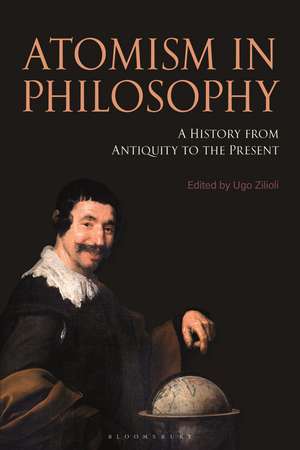Atomism in Philosophy: A History from Antiquity to the Present
Editat de Professor Ugo Ziliolien Limba Engleză Paperback – 27 iul 2022
| Toate formatele și edițiile | Preț | Express |
|---|---|---|
| Paperback (1) | 217.54 lei 6-8 săpt. | |
| Bloomsbury Publishing – 27 iul 2022 | 217.54 lei 6-8 săpt. | |
| Hardback (1) | 870.65 lei 6-8 săpt. | |
| Bloomsbury Publishing – 11 noi 2020 | 870.65 lei 6-8 săpt. |
Preț: 217.54 lei
Nou
Puncte Express: 326
Preț estimativ în valută:
41.63€ • 43.01$ • 34.65£
41.63€ • 43.01$ • 34.65£
Carte tipărită la comandă
Livrare economică 25 martie-08 aprilie
Preluare comenzi: 021 569.72.76
Specificații
ISBN-13: 9781350355057
ISBN-10: 1350355054
Pagini: 592
Dimensiuni: 156 x 234 mm
Greutate: 0.7 kg
Editura: Bloomsbury Publishing
Colecția Bloomsbury Academic
Locul publicării:London, United Kingdom
ISBN-10: 1350355054
Pagini: 592
Dimensiuni: 156 x 234 mm
Greutate: 0.7 kg
Editura: Bloomsbury Publishing
Colecția Bloomsbury Academic
Locul publicării:London, United Kingdom
Caracteristici
Covers thinkers and movements in ancient, medieval, modern and contemporary philosophy, together with varieties of atomism in non-Western thought
Notă biografică
Ugo Zilioli is Leverhulme Researcher at the Faculty of Theology and Religion at the University of Oxford and Associate Member of Lady Margaret Hall, UK. He is author of Protagoras and the Challenge of Relativism: Plato's Subtlest Enemy (2007; 2nd edition 2016), The Cyrenaics (2014) and editor of From the Socratics to the Socratic Schools: Classical Ethics, Metaphysics and Epistemology (2015).
Cuprins
List of ContributorsPreface & AcknowledgmentsAbbreviations and Transliterations General Introduction, Ugo Zilioli PART I. ATOMISM IN ANCIENT PHILOSOPHY 1. Early Ancient Atomism, Similarities and Differences, Andrew Gregory2. The Reception of Atomism in Ancient Medical Literature: From Hippocrates to Galen, Vincenzo Damiani3. Why Aren't Atoms Coloured?, David Sedley4. Atoms and Minimal "Parts": The Originality of Epicurean Atomism, Francesco Verde5. Atoms and Universals in Epicurus, Attila Nemeth6. Atoms, Complexes and Simples in the Theaetetus, Sophie-Grace Chappell7. Atomism in Plato's Timaeus, Luca Pitteloud PART II. ATOMISM IN NON-WESTERN, MEDIEVAL AND MODERN PHILOSOPHY 8. Atoms and Orientation: Vasubandhu's Solution To The Problem Of Contact, Amber Carpenter and Ngaserin Ng Jing Ya9. Aggregates versus Wholes: An Unresolved Debate between the Ny¯aya-Vai´ses.ika and Buddhist Schools in Ancient Indian Atomism, Sahotra Sarkar10. Atomism and Islamic Thought, Francesco Omar Zamboni11. Atoms and Time I, Charles Doyle12. Atoms and Music in Late Medieval Philosophy, Philippa Ovenden13. Atomism and the Cambridge Platonists, Adrian Mihai14. Atomism and Society in William Petty, Akos Sivado15. Atoms, Colours, and God in Leibniz, Alberto Artosi PART III. ATOMISM IN CONTEMPORARY THOUGHT Section I: Philosophy16. Logical Atomism and Wittgenstein, Annalisa Coliva17. Atomism and Semantics in the Philosophy of Jerrold Katz, Keith Begley18. Atoms and Knowledge, Nick Treanor19. Atoms and Time II, Mauro Dorato20. Atomism and Marxism in Louis Althusser, Panagiotis Sotiris21. Atomism and Liberalism, Philip Krinks Section II: Metaphysics22. Atoms as Universals, Matthew Tugby23. Atoms and Extended Simples, Travis Dumsday24. Power Gunk, or Unlimitedly Divided Powers, Anna Marmodoro and Andrea Roselli25. Atoms and Tropes, Peter Simons Section III: The Sciences: Physics and Chemistry26. Atoms and Physics-Based Structuralism, Matteo Morganti27. Atoms and Chemistry I: Not a Success Story, Paul Needham28. Atoms and Chemistry II, Robin Hendry Index
Recenzii
This landmark collection treats the complex problem of atomism with the sophistication it deserves, providing ample resources for studying its historical and systematic aspects. I am particularly glad to see that pertinent mereological discussions from the Indian and Islamic traditions are covered as well.
An indispensable collection for all interested in metaphysics. The essays are remarkably lucid, providing any interested reader with deft summaries and clear signposts. This comprehensive collection works as compelling history of how a fundamental idea in classical Greek philosophy travelled through epochs and across disciplines, finding reverberations in classical Asian philosophy, while inspiring insight to problems and continuing to cause questions and provoke debate in this global millennium.
This inspiring collection begins with a series of important and original studies of atomism as a philosophical and scientific theory in Latin and Greek antiquity. But it goes on to offer an intellectual journey through a web of historical parallels to the ancient Western theories, and receptions and reinventions of atomism through to contemporary metaphysics. It is rare for such a wide-ranging collection to cohere so well, or to offer so much to seduce the reader into broadening the horizons of their interest in the subject.
This is an original and unprecedented collection. It is not just a history of atomism, from antiquity to the present day, but also - and perhaps more significantly - an exploration of what it means to be an atomist in different philosophical areas and so of what atomism ultimately is.
An indispensable collection for all interested in metaphysics. The essays are remarkably lucid, providing any interested reader with deft summaries and clear signposts. This comprehensive collection works as compelling history of how a fundamental idea in classical Greek philosophy travelled through epochs and across disciplines, finding reverberations in classical Asian philosophy, while inspiring insight to problems and continuing to cause questions and provoke debate in this global millennium.
This inspiring collection begins with a series of important and original studies of atomism as a philosophical and scientific theory in Latin and Greek antiquity. But it goes on to offer an intellectual journey through a web of historical parallels to the ancient Western theories, and receptions and reinventions of atomism through to contemporary metaphysics. It is rare for such a wide-ranging collection to cohere so well, or to offer so much to seduce the reader into broadening the horizons of their interest in the subject.
This is an original and unprecedented collection. It is not just a history of atomism, from antiquity to the present day, but also - and perhaps more significantly - an exploration of what it means to be an atomist in different philosophical areas and so of what atomism ultimately is.
